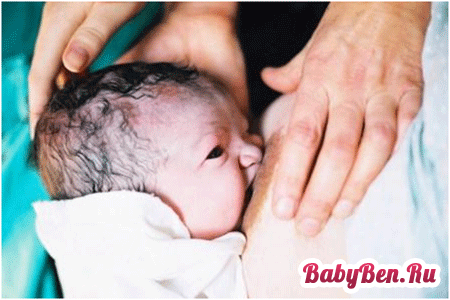
Breastfeeding is an important part of the recovery process in the kid digestion organs necessary microflora. In maternal milk, there is an immunoglobulin, which serves as a protective barrier from the harmful effects of the environment, while the baby's body does not develop immunity and can resist him himself. Therefore, the early attachment of the child is a measure needed.

The content of the article
The value of early applying to the chest
Early applying is good because it gives:
- ensuring the rapid interaction of milk intake reactions and the formation of sustainable follow-up lactation;
- the ability to independently produce oxytocin, which reduces the uterus after the birth of the child and reduces the risk of bleeding in a woman;
- provides a sedative effect on a woman at the expense of the physical contact of the child with his mother;
- the manifestation of motherhood instinct, which forms the installation on breastfeeding for prolonged;
- the ability of a newborn adapt to the environment;
- provides a digestive tract of a baby with a useful microflora with immunity installation.
However, there are contraindications of early attachment of a baby to the chest due to the health status of a woman:
- surgical intervention during childbirth;
- chronic form of gestosis (late toxicosis);
- open bleeding during generic activity;
- tuberculosis, hepatitis;
- chronic diseases of the internal organs;
- endometriosis;
- acute mental disorders;
- viral infections;
- HIV, herpes.

There are also contraindications to early applying due to the state of health of the newborn itself:
- health status Baby on the apgar scale below 7 points;
- a campus of a cord newborn;
- violation of brain vessels;
- prematurity;
- heavy form of congenital vices.
Subsequent stages of breastfeeding with this kind of violations must be completely excluded. The list of prohibitions primarily includes hereditary predisposition, enzymopathy.
Early attachment of the baby to the chest and frequent feeding contribute to the avoidance of a number of diseases, because the broth has a laxative effect, thanks to which the exemption of the intestinal from meconium occurs several times faster. Breastfeeding also helps to avoid bile accumulation syndrome and jaundice.
Free feeding mode
Breastfeeding is the main component of part in the period of full lactation. The free mode of applying to the chest is feeding at the request of the child, and not at certain intervals and the clock. The process occurs at any time of the day when the child is actively asking to eat.
To support the body of the kid, night feeding is very important, since at this time there is a decrease in the concentration of the prolactin hormone, which contributes to milk supply.

Duration of applying to the chest
In the first week after birth, breastfeeding should be carefully supported, even if the baby sucks a little milk. The child needs food from 8-10 to 12 times a day. It is necessary to feed right away as soon as the newborn will have the need to eat.
The first months of the life of the baby are the main in the formation of all vital bodies, as well as in adapting to the new existence environment. At this stage of the child's life, it is important to comply with the rules of applying to the chest, in order not to bring the process in the persistence. To prevent such a situation, a nursing woman should carefully follow the behavior of the baby, take into account all his actions to feeding and after. Also during the lactation, it is necessary to learn to distinguish the gusts of crying and anxiety from hunger. Baby feed in the first months of life is needed no more than 20 minutes with further applied in the amount of 7-8 times with a duration of 10-15 minutes.
Free feeding with breast milk is making contact of the psycho-emotional background between the kid and his mother. This is the main for the child and the future development of his intellect.
